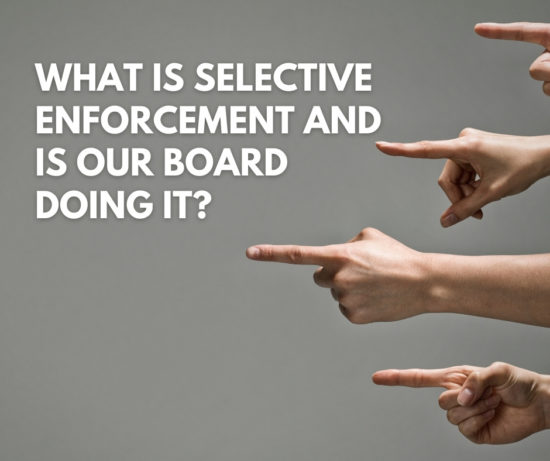
In its most basic form, “Selective Enforcement” is when an association’s board chooses, at its discretion, to enforce a particular rule or obligation against one owner or group of owners but not to enforce that same rule or obligation against other owners.
Selective Enforcement isn’t always ill-intended; in fact, in many ways, the board believes it is just helping its neighbors or fellow member of the association. For example, a board may know that a particular owner is facing financial hardship and wants to assist that owner so it debates waiving late fees, and interest for her, or perhaps the board is aware of an elderly owner in the community who struggles to maintain his lawn so it discusses whether or not to impose fines against that owner.
Selective Enforcement can also be perceived as intentionally or unintentionally prejudicial – where other owners in the association allege that the board is allowing friends and/or fellow board members to “get away” with violations for which other owners are being held accountable. Sometimes Selective Enforcement is alleged simply because a prior board may have failed to enforce a specific covenant obligation or financial penalty. (Keep in mind that an Association must be acting in good faith. Inadvertently overlooking a violation isn’t Selective Enforcement – sometimes a mistake is just a mistake. Likewise, if the violation isn’t present at the time of a community inspection, then it isn’t Selective Enforcement not to note the violation at that time since it wasn’t actually there. Don’t confuse Selective Enforcement with “Perfect” Enforcement).
One of the most frequent issues that seem to come up with Selective Enforcement is when a board is asked to waive assessments, late fees, and interest for an owner or owners in the community or the board receives a request to waive other covenant requirements in the community for the owner(s). Certainly well-intended, the board’s initial instinct may be to assist an owner by trying to waive some or all of the balance or covenant requirements to the association. Perhaps it’s because one of the board members is more familiar with the owner or owners’ personal situation, or perhaps an owner has been more vocal about requesting assistance.
A board has discretion to entertain the requests for waiver or lifting of requirements for an owner based upon individual and specific facts and circumstances. And the board should desire to treat similarly situated owners fairly and in the same manner so as not to be selectively enforcing its rules and obligations.
So, what do you do to keep selective enforcement at bay? Here are a few things to get you started:
- Get organized and get some standard procedures in place! Know your association’s policies and consistently and fairly enforce them. Make sure the policies and rules are clear… and follow them.
- Review your documents – most boards are prohibited by their governing documents from waiving assessments.
- When considering deviating from a procedure, maintain a paper trail of the reasoning behind the deviation (or enforcement). For example, if the board wants to waive late fees and interest for an owner who is facing a medical emergency, then document the reasoning behind this decision.
- Play fair. No special treatment for any owner simply because a board member has a relationship with the owner.
- And finally, prepare yourself for some disgruntled folks because not everyone is going to be happy if things don’t work out in their favor. It’s ok – you’re just doing your fiduciary duty as a board member.
Please contact an Altitude attorney with any questions about selective enforcement at 303.432.9999 or at [email protected].